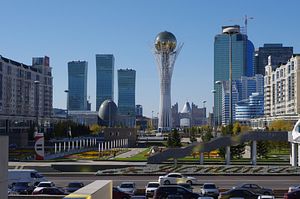When the first Pugwash conference met 60 years ago, the risk of nuclear war was severe. The Cold War was at its height and the world was in the middle of a terrifying arms race. The fear was that nuclear weapons might be used, either deliberately or by accident, to trigger a global catastrophe.
This threat to all humanity led eminent scientists from the nuclear powers to bring their voices together to warn of the dangers of nuclear weapons proliferation. Galvanized by warnings from Albert Einstein, whose work inadvertently opened the door to the nuclear age, they met in Pugwash, Canada to encourage countries to move towards nuclear disarmament.
Six decades later, the Cold War is long over. While tensions and misunderstanding between the major powers remain – and need to be reduced – the prospect of these powers going to war has all but disappeared. But this does not mean the dangers that nuclear weapons pose have vanished.
In recent years, we have seen new threats emerge. There is now a major risk of nuclear weapons and technology falling into the hands of terrorist groups. These fanatics have been actively seeking such weapons and would not hesitate to use them. Their aim would be to cause as much death and destruction as possible in pursuit of their perverted goals.
We have also seen as well new states attempting to acquire nuclear weapons. In recent months, North Korea, for example, has been carrying out nuclear and missile tests in defiance of international agreements. These programs have increased fears and led to rising regional and global tensions.
It is this sombre background which makes the Pugwash Conference on Science and World Affairs in Astana this week both relevant and important. More than 200 international experts will meet in Kazakhstan’s capital to discuss how to make progress on global nuclear security and disarmament.
Among the topics to be debated are strengthening the nuclear test ban and how to work together to combat terrorism. Regional issues, with global significance, such as the challenges of peacebuilding in Afghanistan are also on the agenda.
There is, of course, good reason for Astana to host this influential international forum. No country in peacetime has suffered more from the impact of nuclear weapons than Kazakhstan or done more, by our actions or our campaigning, to champion the cause of disarmament.
Over 40 years, our country was the setting for almost 500 nuclear tests above and under the ground. These explosions have left a terrible legacy in terms of damage to human health and our environment. Thousands of our citizens have suffered illness or birth defects while large areas of land remain contaminated.
This terrible history explains why our country has taken such a strong stand against nuclear weapons. We voluntarily gave up the world’s fourth largest nuclear arsenal which we had inherited upon the breakup of the Soviet Union and have taken every step to encourage other countries to follow our example.
We have taken a global lead as well against nuclear tests. Even before we became fully independent in 1991, our President Nursultan Nazarbayev closed the Semipalatinsk testing site. The date of this decision – August 29th – is now officially recognized by the United Nations, at our initiative, as the International Day Against Nuclear Tests.
It is fitting, too, that August 29th has been chosen for the official ceremony to mark the opening of the International Atomic Energy Agency’s Low Enriched Uranium (LEU) Bank which has been sited in Kazakhstan. The bank is an important and practical step to prevent nuclear proliferation and reduce tensions while allowing countries to develop civilian nuclear programs.
The confidence that the LEU Bank gives of a guaranteed supply of enriched uranium has already helped reach international agreement with Iran over its nuclear program. It highlights what can be achieved to make our world safer from the threat of nuclear weapons through dialogue and cooperation and must provide a model for further steps towards disarmament in the years to come.
The campaign to rid our world of nuclear weapons is, as President Nazarbayev rightly told the United Nations, the cause of our time. We must all hope the frank and open discussions that will take place at the Pugwash Conference – 60 years after that first memorable meeting – helps move us closer towards this critical goal.
Kassym-Jomart Tokayev is Chairman of the Senate of Kazakhstan.
































